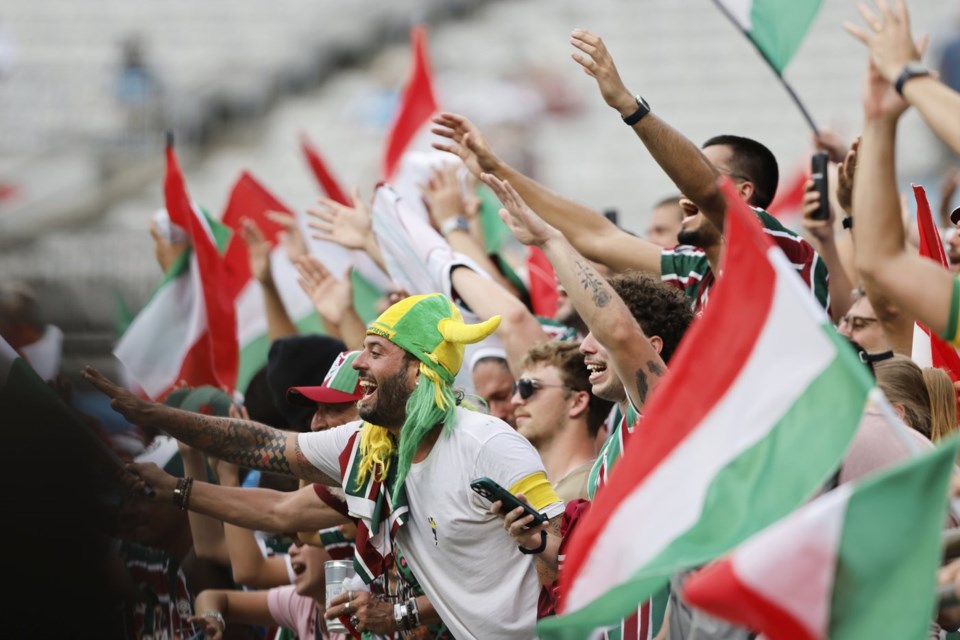CHARLOTTE, N.C. (AP) — Lifelong soccer fan Victor Dumois expressed concern about the United States co-hosting the 2026 World Cup after attending a recent Club World Cup match in Miami.
“I think after the Copa America, a weird phenomenon has occurred here," said Dumois, who is from Spain. “There’s people that don’t like the World Cup being in the United States.”
The Copa America championship game last year in Miami was a security nightmare, with overheated and ticketless fans breaking down the barriers at Hard Rock Stadium to get inside. Eventually the game was played, although some paying customers never were able to get to their seats because they were occupied. Some cited the debacle as one example of how unprepared the United States is to host soccer's biggest tournament.
Fast-forward to this summer and the 32-team Club World Cup hosted solely in the United States.
Dumois said security was tight this time around — almost to a fault.
“In Spain, it is different, you can just have an Uber or taxi take you right up to the stadium," Dumois said, sharing his thoughts on the Round 16 match between Real Madrid and Juventus. "Here in Miami, they have to leave you outside and far away. There’s so many layers of security, it’s too much.”
The Club World Cup, which is entering the quarterfinals this weekend, has served as a tune-up for the United States which, along with Canada and Mexico, will host the 2026 World Cup in cities like Miami, Atlanta, Boston, Dallas, Houston, Kansas City, Los Angeles, Philadelphia, San Francisco and Seattle.
So far, the club tournament has not been well-attended, except for a handful of matches.
A Round of 16 knockout match at Charlotte's 75,000-seat Bank of America Stadium between Fluminense and Inter Milan drew just 20,030 fans. Stadium officials allowed fans who'd purchased upper deck tickets to move down to the lower bowl. Even then, lower bowl looked half full.
Empty seats have been a common sight across the country.
There are variety of reasons why.
First, the club tournament simply isn't as popular as the World Cup, where players are competing for their countries rather than a club team.
The costs — both for games and travel — have also kept some away.
And, for some, there have been lingering concerns of potential U.S. Immigration and Customs Enforcement raids at matches amid President Donald Trump's crackdown on illegal immigration.
The weather hasn't helped either.
Benjamin Cabral lives in Boston, but his family is from Azoras, an autonomous region of Portugal.
He said if FIFA hopes to grow the game in America, a scheduling change is necessary. Due to soccer’s popularity in Europe, many club matches have been played in the middle of the day so fans overseas can watch games on television or livestream in real time at night.
The downside is players have been forced to play with temperatures above 90 degrees Fahrenheit (32 Celsius) while a major heat wave gripped the States.
“If they’re trying to grow their game in the US, they need to make the games later,” Cabral said. “It’s too hot out here for the players."
It hasn’t been easy on fans, either.
“There’s no roof, no screens, not much,” said Carlos Olguin, who made the trek from Mexico to Charlotte to watch Pachuca play Real Madrid.
Next year’s World Cup will be played during a similar time frame, beginning in mid-June and concluding in mid-July.
Excitement surrounding the current event also remains a concern.
“The other thing in the city is that it should be more prepared for the event, because there are people who don’t even know there’s an event and so you go to a restaurant with the idea that there are flags, fans, more football things and there’s nothing,” Olguin added of the Club World Cup. “The city should be more prepared for the event, because there are people who don’t even know there’s an event.”
As for the venues, spectators attending Club World Cup matches offered differing reviews of American stadiums and host cities leading up to the country hosting the World Cup for the first since 1994.
"I’ll be honest, the U.S. is not ready to host the World Cup," said Jeremy Zuniga from South Carolina. "There’s too many people coming from South America, Europe, everybody.”
Others, like Rogerio Bajos from Peru, feel differently.
“I think it’s been good, we haven’t had any problems," said Bajos, who also attended a CWC game in Miami. “The parking is no problem, the security has been good. Overall, a stupendous spectacle.”
Humberto Contasta from Miami said the Club World Cup should help the American co-hosts iron out some issues before next summer.
Daniel Marques, who made the trek from Portugal to Charlotte for the sole purpose of watching Benfica battle Chelsea in a group play match, said he was impressed overall with how the tournament was run.
Guilherme Altoe agreed.
Altoe, who grew up watching World Cup matches in Brazil before moving to the United States nearly a decade ago, said he thinks the United States will put on a good event next summer.
“I think the United States has everything, all the infrastructure to host a World Cup,” he said. “So we are excited to have them see all the fans from different places and have family come around and it will be a great time.”
___
Freelancers Andres Jaime-Mendez and Max Feliu Merce contributed to this report.
___
AP soccer: https://apnews.com/soccer
Steve Reed, The Associated Press


